一般现在时及三单(综合)
- 格式:doc
- 大小:103.00 KB
- 文档页数:17
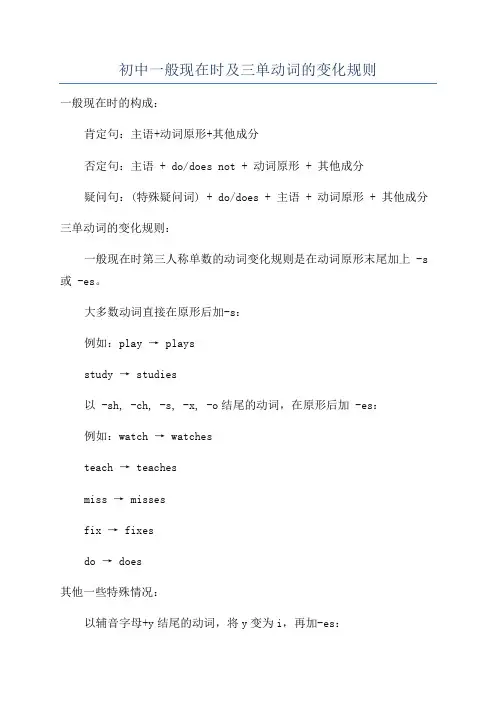
初中一般现在时及三单动词的变化规则
一般现在时的构成:
肯定句:主语+动词原形+其他成分
否定句:主语 + do/does not + 动词原形 + 其他成分
疑问句:(特殊疑问词) + do/does + 主语 + 动词原形 + 其他成分三单动词的变化规则:
一般现在时第三人称单数的动词变化规则是在动词原形末尾加上 -s 或 -es。
大多数动词直接在原形后加-s:
例如:play → plays
study → studies
以 -sh, -ch, -s, -x, -o结尾的动词,在原形后加 -es:
例如:watch → watches
teach → teaches
miss → misses
fix → fixes
do → does
其他一些特殊情况:
以辅音字母+y结尾的动词,将y变为i,再加-es:
例如:fly → flies
study → studies
以元音字母+y结尾的动词,直接加-s:
例如:play → plays
enjoy → enjoys
以-o结尾的动词,大多数加-es:
例如:do → does
go → goes
但也有例外,像是have、go这些常用的动词变化为has和goes。
需要注意的是,不可数名词和第三人称单数主语时,一般现在时动词不变化,依然使用动词原形:
例如:Water boils at 100 degrees Celsius.
She sings beautifully.。

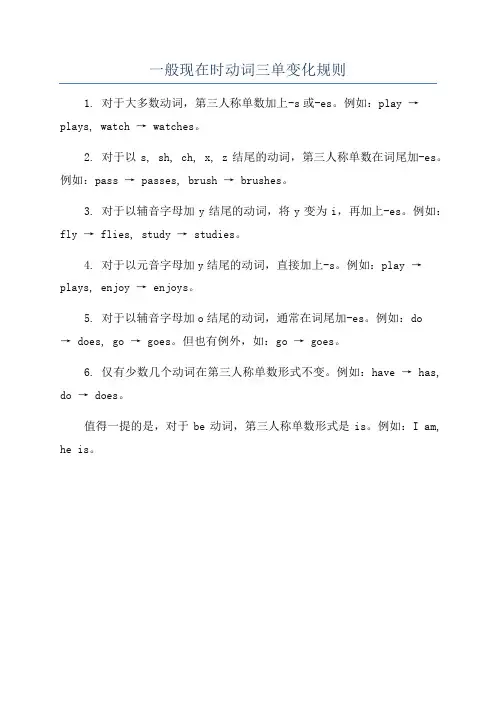
一般现在时动词三单变化规则
1. 对于大多数动词,第三人称单数加上-s或-es。
例如:play → plays, watch → watches。
2. 对于以s, sh, ch, x, z结尾的动词,第三人称单数在词尾加-es。
例如:pass → passes, brush → brushes。
3. 对于以辅音字母加y结尾的动词,将y变为i,再加上-es。
例如:fly → flies, study → studies。
4. 对于以元音字母加y结尾的动词,直接加上-s。
例如:play → plays, enjoy → enjoys。
5. 对于以辅音字母加o结尾的动词,通常在词尾加-es。
例如:do
→ does, go → goes。
但也有例外,如:go → goes。
6. 仅有少数几个动词在第三人称单数形式不变。
例如:have → has, do → does。
值得一提的是,对于be动词,第三人称单数形式是is。
例如:I am, he is。
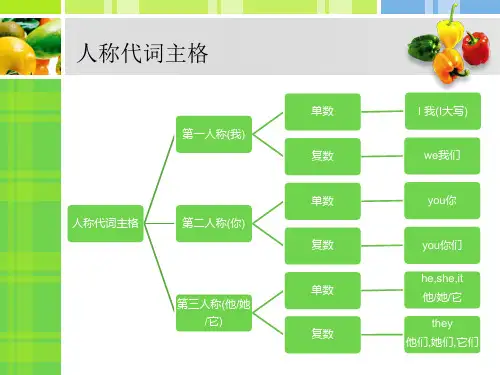
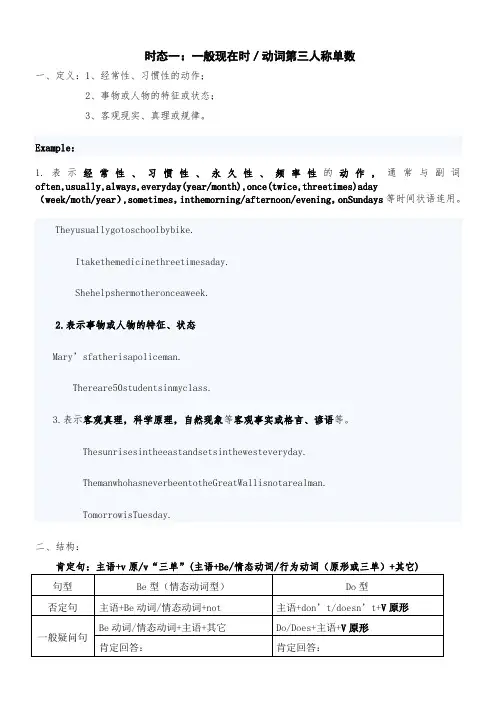
时态一:一般现在时/动词第三人称单数一、定义:1、经常性、习惯性的动作;2、事物或人物的特征或状态;3、客观现实、真理或规律。
Example:1.表示经常性、习惯性、永久性、频率性的动作,通常与副词often,usually,always,everyday(year/month),once(twice,threetimes)aday二、结构:肯定句:主语+v原/v“三单”(主语+Be/情态动词/行为动词(原形或三单)+其它)否定句:主语+Be/情态动词/do/dose+not+其它一般疑问句:Be/情态动词/do/dose+主语+其它特殊疑问句:特殊疑问词+Be动词/情态动词/do/dose+主语+其它(对主语提问除外)对主语提问的特殊疑问句=特殊疑问词+主语+动词原形/三单(肯定句的结构)+?Thisbookisyours.这本书是你的。
Thatcarisred.那辆小汽车是红色的。
ThecatisLucy's.这只猫是露茜的。
4、不定代词someone,somebody,nobody,everything,something等及指示代词this,that作主语时,是第三人称单数。
如:Everyoneishere.大家到齐了。
Thereissomethingwrongwiththewatch.这块手表有毛病。
Thisisapen.这是一支钢笔。
Thatisaneraser.那是一块橡皮擦。
5、不可数名词作主语时为第三人称单数。
如:Themilkisintheglass.牛奶在玻璃杯里。
Thebreadisverysmall.那面包很小。
6、当数字或字母作主语时,看作第三人称单数。
如:"6"isaluckynumber."6"是个吉利数字。
练习一:一般现在时/三单的练习题(一).用动词的适当形式填空1.She_________(go)toschoolatseveno’clock.改为一般疑问句:5.IwatchTVeveryday.改为一般疑问句:6.Davidhasgotagoal.改为一般疑问句:7.Wehavefourlessons.否定句:8.Nancydoesn’trunfast肯定句:9.Mydogrunsfast.否定句:一般疑问句:10. Mikehastwolettersforhim.一般疑问句:否定句:11. Iusually(playfootball)onFridayafternoon.否定句:一般疑问句:☆通过下列练习,你能否找到一些可用的规律?肯定句1.We_____(play)footballeveryday.2.Jim_____(want)anorange.3.Mymother______(watch)TVintheevening.4.She______(know)alittle(一点儿)English.5.Myfatheralways________(come)backfromworkverylate.6.Theteacherisbusy.He________(sleep)sixhoursaday.7.Thegirl_______(like)wearingaskirt.8.We_____(go)toschoolat7:30inthemorning.9._______Mike_______(read)Englisheveryday?10._______she_______(do)thehouseworkeveryday?11._______she_______(like)playingtheviolin?Yes,she_______(do).12._______they_______(like)theWorldCup?特殊疑问句1.Whatcolor_______yoursister_______(like)?2.Where_______you_______(have)luncheveryday?3.Whattime_______hisfather_______(do)thework?4.What_______(do)heusually_______(do)afterschool?5.Howmanylessons_______yourclassmates_______(have)onMonday?12.—_________________________________________________________________4.Amyli kesplayingcomputergames.(改为一般疑问句,并作否定回答)_________________________________________________________________5.Wegot oschooleverymorning.(改为否定句)_________________________________________________________________6.HespeaksEnglishverywell.(改为否定句)_________________________________________________________________7.Ilike takingphotosinthepark.(对划线部分提问)_________________________________________________________________8.Johnc omesfromCanada.(对划线部分提问)chTVeveryday.(改为一般疑问句)_________________________________________________________________16.Davi dhasgotagoal.(改为一般疑问句)_________________________________________________________________17.Weha vefourlessons.(改为否定句)__________________________________________ 18.Nancydoesn'trunfast.(改为肯定句)__________________________________________ 19.DanielwatchesTVeveryevening.(改为否定句)__________________________________________否定回答:对划线部分提问(特殊疑问句):3.Theyareonthechair.否定句:一般疑问句:肯定回答:否定回答:对划线部分提问(特殊疑问句):4.Thereisabirdinthesky.否定句:一般疑问句:肯定回答:否定句否定句7.Lilyhasablackball.否定句:一般疑问句:肯定回答:否定回答:对划线部分提问(特殊疑问句):8.Myfriendslikesapples.否定句:一般疑问句:肯定回答:否定回答:对划线部分提问(特殊疑问句):。
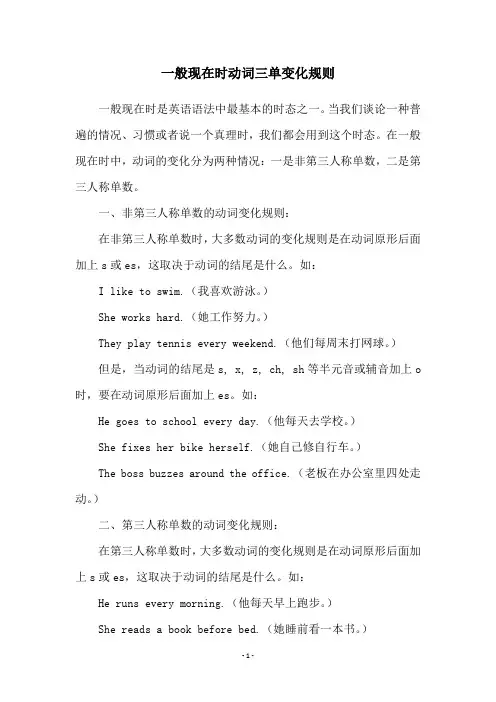
一般现在时动词三单变化规则一般现在时是英语语法中最基本的时态之一。
当我们谈论一种普遍的情况、习惯或者说一个真理时,我们都会用到这个时态。
在一般现在时中,动词的变化分为两种情况:一是非第三人称单数,二是第三人称单数。
一、非第三人称单数的动词变化规则:在非第三人称单数时,大多数动词的变化规则是在动词原形后面加上s或es,这取决于动词的结尾是什么。
如:I like to swim.(我喜欢游泳。
)She works hard.(她工作努力。
)They play tennis every weekend.(他们每周末打网球。
)但是,当动词的结尾是s, x, z, ch, sh等半元音或辅音加上o 时,要在动词原形后面加上es。
如:He goes to school every day.(他每天去学校。
)She fixes her bike herself.(她自己修自行车。
)The boss buzzes around the office.(老板在办公室里四处走动。
)二、第三人称单数的动词变化规则:在第三人称单数时,大多数动词的变化规则是在动词原形后面加上s或es,这取决于动词的结尾是什么。
如:He runs every morning.(他每天早上跑步。
)She reads a book before bed.(她睡前看一本书。
)The cat eats fish.(猫吃鱼。
)但是,当动词的结尾是s, x, z, ch, sh等半元音或辅音加上o 时,要在动词原形后面加上es。
另外,以辅音+y结尾的动词,要改为以i结尾,再加es。
如:He goes to school every day.(他每天去学校。
)She fixes her bike herself.(她自己修自行车。
)The boss buzzes around the office.(老板在办公室里四处走动。
)He studies hard every day.(他每天努力学习。
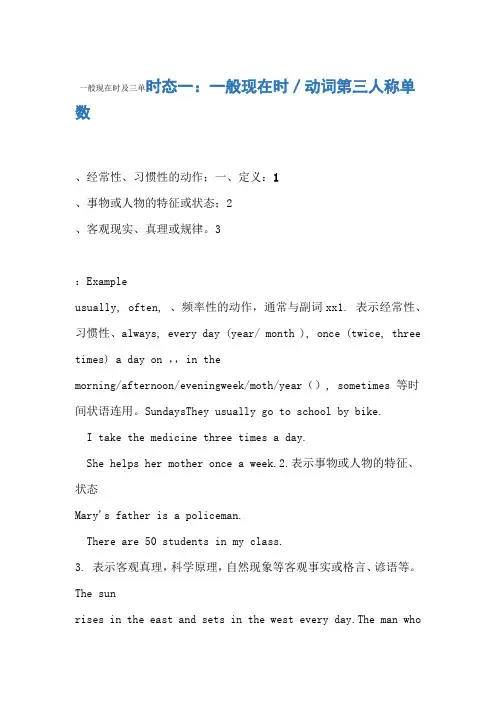
一般现在时及三单时态一:一般现在时/动词第三人称单数、经常性、习惯性的动作;一、定义:1、事物或人物的特征或状态;2、客观现实、真理或规律。
3:Exampleusually, often, 、频率性的动作,通常与副词xx1. 表示经常性、习惯性、always, every day (year/ month ), once (twice, three times) a day on ,,in themorning/afternoon/eveningweek/moth/year(), sometimes 等时间状语连用。
SundaysThey usually go to school by bike.I take the medicine three times a day.She helps her mother once a week.2.表示事物或人物的特征、状态Mary's father is a policeman.There are 50 students in my class.3. 表示客观真理,科学原理,自然现象等客观事实或格言、谚语等。
The sunrises in the east and sets in the west every day.The man whohas neverbeen to the Great Wall is not a real man.Tomorrow is Tuesday. 一般现在时及三单二、结构:肯定句:主语 + v原 /v“三单” (主语+ Be/情态动词/行为动词(原形或三单)+其它)否定句:主语+Be/情态动词/do/dose+not+其它一般疑问句:Be/情态动词/do/dose + 主语+其它特殊疑问句:特殊疑问词 + Be 动词/情态动词/do/dose + 主语+其它(对主语提问除外)对主语提问的特殊疑问句= 特殊疑问词+主语+动词原形/三单(肯定句的结构)+?总结:行为动词表示具体的动作,be动词表示状态,情态动词表示态度。
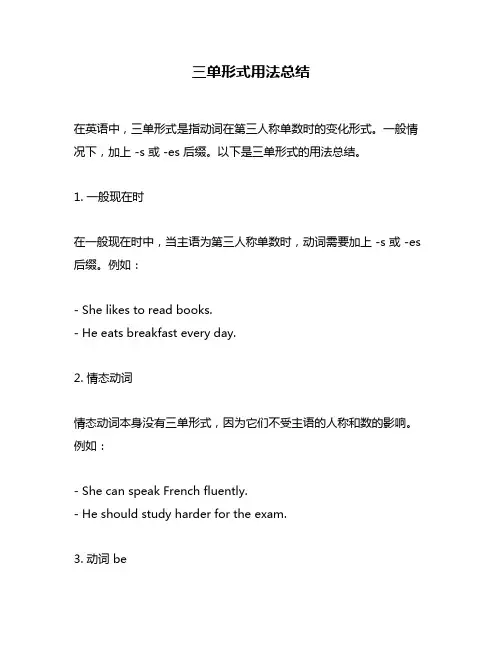
三单形式用法总结
在英语中,三单形式是指动词在第三人称单数时的变化形式。
一般情况下,加上 -s 或 -es 后缀。
以下是三单形式的用法总结。
1. 一般现在时
在一般现在时中,当主语为第三人称单数时,动词需要加上 -s 或 -es 后缀。
例如:
- She likes to read books.
- He eats breakfast every day.
2. 情态动词
情态动词本身没有三单形式,因为它们不受主语的人称和数的影响。
例如:
- She can speak French fluently.
- He should study harder for the exam.
3. 动词 be
在动词 be 中,第三人称单数需要使用 is。
例如:
- She is a teacher.
- It is raining outside.
4. 动词 have
在动词 have 中,第三人称单数需要使用 has。
例如:
- She has a cat.
- He has been to Japan twice.
5. 不规则动词
有些不规则动词在第三人称单数时需要进行变化。
例如:
- He goes to school every day.
- She does her homework after dinner.
- It rains a lot in this city.
总之,在英语中使用正确的三单形式是非常重要的。
通过掌握以上几种用法,可以更好地运用英语表达自己的意思,并避免犯错。
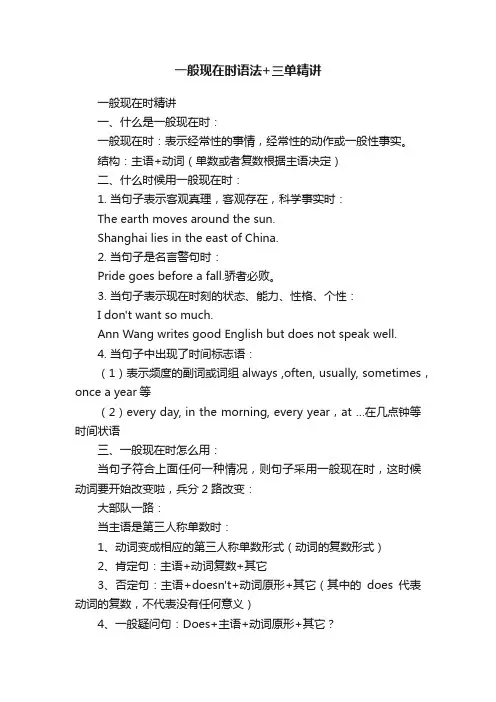
一般现在时语法+三单精讲一般现在时精讲一、什么是一般现在时:一般现在时:表示经常性的事情,经常性的动作或一般性事实。
结构:主语+动词(单数或者复数根据主语决定)二、什么时候用一般现在时:1. 当句子表示客观真理,客观存在,科学事实时:The earth moves around the sun.Shanghai lies in the east of China.2. 当句子是名言警句时:Pride goes before a fall.骄者必败。
3. 当句子表示现在时刻的状态、能力、性格、个性:I don't want so much.Ann Wang writes good English but does not speak well.4. 当句子中出现了时间标志语:(1)表示频度的副词或词组always ,often, usually, sometimes,once a year等(2)every day, in the morning, every year,at …在几点钟等时间状语三、一般现在时怎么用:当句子符合上面任何一种情况,则句子采用一般现在时,这时候动词要开始改变啦,兵分2路改变:大部队一路:当主语是第三人称单数时:1、动词变成相应的第三人称单数形式(动词的复数形式)2、肯定句:主语+动词复数+其它3、否定句:主语+doesn't+动词原形+其它(其中的does代表动词的复数,不代表没有任何意义)4、一般疑问句:Does+主语+动词原形+其它?5、肯定回答:Yes,主语+does6、否定回答:No,主语+doesn't7、特殊疑问句:特殊疑问词+一般疑问句?(一般疑问句中用does)小分队一路:当主语不是第三人称单数时:1、动词不变成相应的第三人称单数形式(动词不用变成复数)2、肯定句:主语+动词原形+其它3、否定句:主语+don't+动词原形+其它(其中的do代表动词的单数,不代表没有任何意义)4、一般疑问句:Do+主语+动词原形+其它?5、肯定回答:Yes,主语+do6、否定回答:No,主语+don't7、特殊疑问句:特殊疑问词+一般疑问句?(一般疑问句中用do)总结起来就是这样的一般现在时的结构肯定式疑问式否定式否定疑问式I work. Do you work? I don't work. Don't you work?You work. Do you work? You don't work. Don't you work?We work. Do you work? We don't work. Don't you work?They work. Do they work? They don't work. Don't they work?Doesn't he(she it)He(She,It) works. Does he(she,it) work? He(She,It) doesn't work.work?四、那么,动词如何变成复数呢:三单变化:(1)直接在动词词尾加-s.ask---asks work---works get---gets stay---stays(2)以字母s, x, ch, sh或o结尾的动词,在词尾直接加-es.watch---watches wish---wishes fix---fixes do---doesgo---goes pass---passes(3)以“辅音字母加- y”结尾的动词,要先变y为i再加-es.try---tries study---studies cry---cries fly---flies情况构成方法读音例词一般情况加-s 清辅音后读/s/ 浊辅音和元音后读/z/swim-swims;help-helps;like-likes以辅音字母+o结尾的词加-es 读/z/ goes,does以s,sh,ch,x等结尾的词加-es 读/iz/ watches,washes 以辅音字母+y结尾的词变y 为i再加es 读/z/ study-studies不规则变化have 和be动词变have 为has变be为am,is,arehave-has be-am,is,are一般现在时专项练习一、考点/易错点1动词变形有误1 He __ football very well.2 Danny __ to school at 7:10.答案:1 plays 2 goes plaies, gos解析:1以辅音字母加y结尾的动词变单三人称形式才能把y换成i再加es;2与名词变复数不同,变单三人称形式以o结尾的词要加es.考点/易错点2对主语判断有误例:This book __mine答案: is解析: 书是属于“它(it)”的范围,是无生命的它,所以也是三单。
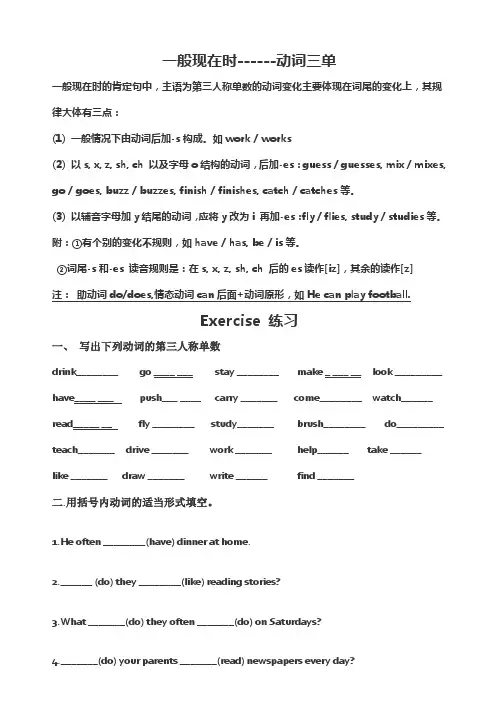
一般现在时------动词三单一般现在时的肯定句中,主语为第三人称单数的动词变化主要体现在词尾的变化上,其规律大体有三点:(1) 一般情况下由动词后加-s构成。
如work / works(2) 以s, x, z, sh, ch 以及字母o结构的动词,后加-es:guess / guesses, mix / mixes, go / goes, buzz / buzzes, finish / finishes, catch / catches等。
(3) 以辅音字母加y结尾的动词,应将y改为i 再加-es:fly / flies, study / studies等。
附:①有个别的变化不规则,如have / has, be / is等。
②词尾-s和-es 读音规则是:在s, x, z, sh, ch 后的es读作[iz],其余的读作[z]Exercise 练习一、写出下列动词的第三人称单数drink________ go ____ ___ stay ________ make _ ___ __ look _________ have____ ___ push___ ____ carry _______ come________ watch______ read_____ __ fly ________ study_______ brush________ do_________ teach_______ drive _______ work _______ help______ take ______like _______ draw _______ write ______ find _______二.用括号内动词的适当形式填空。
1.He often ________(have) dinner at home.2.______ (do) they ________(like) reading stories?3.What _______(do) they often _______(do) on Saturdays?4._______(do) your parents _______(read) newspapers every day?5.The girl _______(teach) us English on Sundays.6.She and I ________(take) a walk together every evening.7.Mike _______(like) cooking.8.They _______(have) the same hobby.9.He can_______(do) his homework well.10.My father is a factory worker. He ______(make) toy cars.11.She _______(go) to school from Monday to Friday.12.The boy often _______(watch) TV in the evening.13.Su Hai and Su Yang _______(have) eight lessons this term.14.He _________(read) English every day.15.We _________(go)to school at seven in the morning.16.Mike________(go)to school at seven in the morning.17.My mother________(like) ______(go) shopping.18.I can ________(draw) many beautiful pictures.19.She_________(make) a model plane.20.Do you ________(like)_________(run)?。
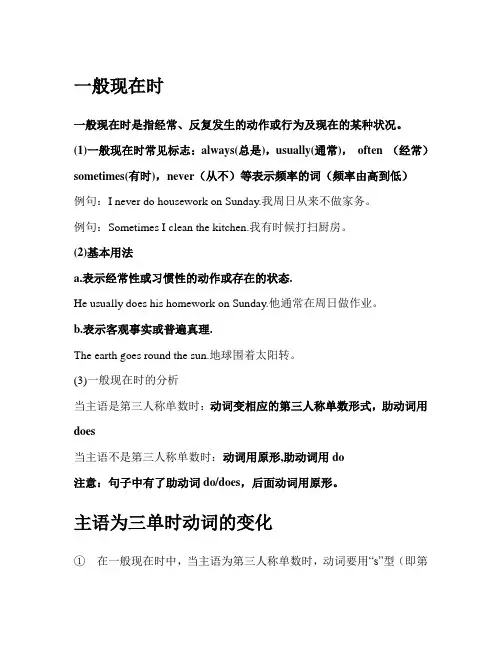
一般现在时一般现在时是指经常、反复发生的动作或行为及现在的某种状况。
(1)一般现在时常见标志:always(总是),usually(通常),often (经常)sometimes(有时),never(从不)等表示频率的词(频率由高到低)例句:I never do housework on Sunday.我周日从来不做家务。
例句:Sometimes I clean the kitchen.我有时候打扫厨房。
(2)基本用法a.表示经常性或习惯性的动作或存在的状态.He usually does his homework on Sunday.他通常在周日做作业。
b.表示客观事实或普遍真理.The earth goes round the sun.地球围着太阳转。
(3)一般现在时的分析当主语是第三人称单数时:动词变相应的第三人称单数形式,助动词用does当主语不是第三人称单数时:动词用原形,助动词用do注意:句子中有了助动词do/does,后面动词用原形。
主语为三单时动词的变化①在一般现在时中,当主语为第三人称单数时,动词要用“s”型(即第三人称单数形式)。
②所谓动词“s”型的构成,与名词变复数相似,即:a)在动词尾直接加s。
如:play—plays,want—wants,work—works,know—knows,help—helps,get—getsb)以字母s、ss、x、ch、sh或o结尾的动词加-es;如:guess—guesses,fix—fixes,teach—teaches,brush—brushes,go—goes,do—does,watch —watches,catch—catches c)以辅音字母+y结尾的动词,先变y为i,再加-es。
如:study—studies,carry—carries,fly—flies,worry—worriesd)以元音字母加y结尾的,直接加s,如:play---plays, stay---stays二.请用动词的适当形式填空。
一、概述一般现在时的概念和用法:(1)表示现阶段经常、反复、习惯性的动作;(2)表示目前的状况;(3)表示自然界的客观真理。
二、一般现在时的结构时态的结构指的是动词的变化形式。
一般现在时间有两种结构,一种是动词原形,用于主语为非第三人称时的情况;另一种为动词的第三人称单数形式,用于主语为第三人称时的情况。
Eg1. We often get up early in the morning.Eg2. My father often gets up early in the morning.三、谈谈“主语为三单,其后动词s添”在一般现在时中,当主语为第三人称单数时,谓语动词要用第三人称单数形式。
可以简单叙述为“主语为三单,其后动词s添”。
何谓第三人称单数?用一句话概括就是“非你、非我、非复数”,如he, she, it, my father, my mother, my sister, our English teacher, Tom, Mike, Liu Jia, China, my book, etc. Eg3.He sometimes goes to school by bike.Eg4.My father works in the hospital as a doctor.4、一般现在时的肯定句中,主语为第三人称单数的动词变化主要体现在词尾的变化上,其规律为:(与名词变成复数的变法大致相同。
)规则原形第三人称单数形式1、一般情况下,直接在动词词尾+s gettakeplaygetstakesplays2、以s, x, sh, ch, o结尾的动词,在词尾+ es guessfixfinishteachgo和doguessesfixesfinishesteachesgoes和does3、以辅音字母+ y 结尾的动词,先把y变为i,再加es studytryflycarryworrystudiestriesfliescarriesworries4、不规则动词(特殊情况)havebehasis五、一般现在时的句子转换(1)当句子中有be动词或情态动词时,则把be动词或情态动词(can,could等等)提到主语的前面变成一般疑问句;在be动词或情态动词后面加not变成否定句.例:①陈述句:She is a student.一般疑问句→ Is she a student?否定句→ She is not a student.②陈述句:I can swim.一般疑问句→ Can you swim否定句→ I can not swim.(2)当句子中即没有be动词,也没有情态动词时,则在主语前加助动词do (you,以及复数),does(单数she,he,it)变成一般疑问句;在主语后谓语动词前加助动词don’t(I,you,以及复数), doesn’t(单数she,he,it)变成否定句,助动词后的动词要变成动词原形。
初一上知识点复习(五)动词一般现在时,一般疑问句,动词三单知识点1.动词一般现在时一般现在时①表示现在的状态,如:He is twelve.Kate is in the room.②表示经常发生或习惯性的动作或状态,如:We often write to each other. 我们时常相互通信。
③表示主语现在的性格、特征、能力,如:I like English.We can speak Chinese.I.当谓语动词是be时谓语动词be包括____ _____ _____ 其意义作____讲,其用法是:我( )用_____;你( )用______; ______用于他( )她( )它( );复数人称都用______.主要句式:1.肯定句式主语+be( ____\ ____\ _____)+其他。
2.否定句式主语+be( ____\ ____\ _____)+not+其他。
3.一般疑问句将提前be( ____\ ___\ ___) ,即:Be( ____\ ___\ ___)+主语+其他?肯定回答 Yes,主语(必须是_____词)+be( ____\ ____\ _____)否定回答 No,主语(必须是_____词)+be( ____\ ____\ _____)+not(必须用缩写形式 ____\ _____)闯关练习I.用be的适当形式填空1.---How____ you? ---I____ fine.2.I___ David,and my family name___ Green.3.---What color ___ your clock? ---It___ white.4.---What___ this in English?---It___ an apple.5.Toy___my brother.David____my brother,too.They ___ my brothers.6.Look!These____apple trees.7.We____ good students and you____ good teacher. 8.My sister and my brother_____ students.9.Five and three ____ eight. 10.____your card number 5578? 11.Where_____ your pencils? 12.Thses sweaters ______ fifty dollars. 13.How much ____ his jacket?14.My brother’s birthday____ December 11th. 15.When _____ Kate’s birthday?II.将下面的句子变成一般疑问句并作出回答1.That is my football.2. Those are his books.3.Jim and Tom are good friends.4.My birthday is November 1st.5. His son is twelve years old.III.将下面的句子变成否定句1.His card is on the table.2. Thses are my parents.3. Bob and Tony are our friends.4.These things are five dollars.5. The girl is his sister.IV.划线提问1. Our teachers are in the classroom.2. The girl’s telephone number is 032-55746.3.Her pen is black.4. September 10th is Teachers’ Day.5. Thery are thirteen years old.6. The boy is fine.7. The old man is my grandfather.8. These socks are five yuan.II.当谓语动词是实义动词时1.当主语是第一人称(____\ ___);第二人称(____)及第三人称复数(____及复数的 ____)时主要句式:(1)肯定句主语+实义动词+其他(2)否定句主语+don’t+实义动词+其他(3)一般疑问句 Do+主语+实义动词+其他肯定回答 Yes,主语(必须是词)+do否定回答 No,主语(必须是词)+don’t2.当主语是第三人称单数(____\ _____\ ____及单数的_______)时主要句式:(1)肯定句主语+实义动词的单三形式+其他(2)否定句主语+doesn’t+实义动词原形+其他(3)一般疑问句 Does+主语+实义动词原形+其他肯定回答 Yes,主语(必须是词)+does否定回答 No,主语(必须是词)+doesn’t动词单三形式变化规则:一、一般情况加s,例如:looks, likes, wants,plays,二、以ch, sh, s, x或o结尾的词,加-es,例如:teaches, washes, guesses, goes, does三、辅音字母+y结尾,变y为i加-es,例如:carry-carries, study-studies特殊变化 have----has读音情况如下:1、在[p], [t], [k], [f]清辅音后,读[s],例如:hopes, invites, asks2、在[z], [s], [ʃ], [tʃ], [dz]后,读[iz],例如:teaches, wishes, fixes3、在浊辅音和元音及其它情况下,读[z],例如:plans, tries, sends闯关练习I..将下面的句子变成一般疑问句并作出回答1.I have a baseball.2.Meria likes apples very much.3.He plays Ping-pang every day.4.We watch TV in the evening.5.Mr Wang often buys lots of things.6. Janey and Mary go to school at 7:30.II. 将下面的句子变成否定句1.I need a bag for sport.2.He wants to go to a movie.3.She often goes to see Beijing Opera.4.The girl has an egg for breakfast.5.We play basketball every day.6.My teacher knows my name.7.It sounds very interesting.III.划线提问1. He likes apples and milk for lunch.2. Mr.Liu plays Ping-pang every day.3. We play basketball every day.IV.用所给词的适当形式填空1.____ her sister ______ (have) a tennis racket? 2._____ your friend ______ (like) basketball?3.We _____ (play) football every day.4.It_____ (sound) very well.5.Jim _____ (want) an orange.7. My mother ______(watch)TV in the evening. 8. ____ you _____ (like) English?9. Mike and Li Lei _______ (not like) eggs. 10. What color_____ your sister______ (like)?知识点2. 一般疑问句归纳什么是一般疑问句呢?我们一起来听听一般疑问句的自白:“Hello, 大家好!我是一般疑问句,我的天性是爱发问。
一、一般现在时中的第三人称单数在一般现在时中,当主语是第三人称单数时,谓语动词要用第三人称单数形式,即常在动词原形后加-s或-es。
动词第三人称单数形式构成规则1、大多数动词在词尾加“S”如:①stop-stops make-makes read-reads play-plays [z]2、以辅音字母加“y”结尾的,要先将“y”变为“i”,然后在加“es”读[iz]如:fly-flies carry-carries study-studies worry-worries3、以“s, x, ch, sh”结尾的,在词尾加“es”,如:teach-teaches watch-watches4、以“o”结尾的动词,加“es”,如:go-goes do-does5、以不发音字母“e”结尾的开音节词,加“s” 如:close-closes [iz]6、特殊:1. be动词包括:am,is,are。
第三人称单数用is;2. 动词have,遇到主语是第三人称单数时,要用has;动词be 的第三人称单数形式is。
He often has dinner at home.Sam goes to school by bus.二、特殊疑问词what 什么(问东西)how 怎样(问身体健康和方式)when 什么时间(问时候)who 谁(问人)whose 谁的(问主人)where 在哪里(问地点)which 哪一个(问选择)why 为什么(问原因)what time 什么时间(问时间)what day 星期几(问星期) what date 什么日期( 问具体日期)what colour 什么颜色(问颜色) how old 多大(问年龄)how many 多少(问数量) how much 多少(问价钱和数量)例句•What is this? It’s an onion.•When is Sue’s birthday?It’s on the 1st of April.. Who is she? She is Linda.. Where is the peach? It’s on the table.. How do you go to school? I go to school by bike..How many apples are there?There are two apples.练一练1.______is she? She’s my sister. Who2.______is the cat? It’s under the car.Where3.______are these? They’re moon cakes. What4.______is your hat? It’s red. What color5. ______subject do you like? I like math. What6.______is your birthday? My birthday is in May. When7.______do you go home? I go home by bus. How1.______’s Christmas? It’s in winter. When2.______do you get at Christmas? We get presents. What3.______presents do you get ? I get a lot . How many4.______present is this? It’s Sue’s. Whose5. ______can we buy Christmas cards? In a bookshop. Where三、is,am,are的用法四、at,on,inat 用在时间名词前指几点钟。
一、概述一般现在时的概念和用法:(1)表示现阶段经常、反复、习惯性的动作;(2)表示目前的状况;(3)表示自然界的客观真理。
二、一般现在时的结构时态的结构指的是动词的变化形式。
一般现在时间有两种结构,一种是动词原形,用于主语为非第三人称时的情况;另一种为动词的第三人称单数形式,用于主语为第三人称时的情况。
Eg1. We often get up early in the morning.Eg2. My father often gets up early in the morning.三、谈谈“主语为三单,其后动词s添”在一般现在时中,当主语为第三人称单数时,谓语动词要用第三人称单数形式。
可以简单叙述为“主语为三单,其后动词s添”。
何谓第三人称单数?用一句话概括就是“非你、非我、非复数”,如he, she, it, my father, my mother, my sister, our English teacher, Tom, Mike, Liu Jia, China, my book, etc.Eg3.He sometimes goes to school by bike.Eg4.My father works in the hospital as a doctor.四、一般现在时的肯定句中,主语为第三人称单数的动词变化主要体现在词尾的变化上,其规律为:(与名词变成复数的变法大致相同。
)五、一般现在时的句子转换(1)当句子中有be动词或情态动词时,则把be动词或情态动词(can,could等等)提到主语的前面变成一般疑问句;在be动词或情态动词后面加not变成否定句.例:①陈述句:She is a student.一般疑问句→ Is she a student?否定句→ She is not a student.②陈述句:I can swim.一般疑问句→ Can you swim否定句→ I can not swim.(2)当句子中即没有be动词,也没有情态动词时,则在主语前加助动词do (you,以及复数), does(单数she,he,it)变成一般疑问句;在主语后谓语动词前加助动词don’t(I,you,以及复数), doesn’t(单数she,he,it)变成否定句,助动词后的动词要变成动词原形。
时态一:一般现在时/动词第三人称单数一、定义:1、经常性、习惯性的动作;2、事物或人物的特征或状态;3、客观现实、真理或规律。
Example:1. 表示经常性、习惯性、永久性、频率性的动作,通常与副词often, usually, always, every day (year/ month ), once (twice, three times) a day(week/moth/year), sometimes,in the morning/afternoon/evening,on Sundays等时间状语连用。
They usually go to school by bike.I take the medicine three times a day.She helps her mother once a week.2.表示事物或人物的特征、状态Mary’s father is a policeman.There are 50 students in my class.3. 表示客观真理,科学原理,自然现象等客观事实或格言、谚语等。
The sun rises in the east and sets in the west every day.The man who has never been to the Great Wall is not a real man.Tomorrow is Tuesday.二、结构:肯定句:主语 + v原 /v“三单” (主语+ Be/情态动词/行为动词(原形或三单)+其它)否定句:主语+Be/情态动词/do/dose+not+其它一般疑问句:Be/情态动词/do/dose + 主语+其它特殊疑问句:特殊疑问词 + Be 动词/情态动词/do/dose + 主语+其它(对主语提问除外)对主语提问的特殊疑问句= 特殊疑问词+主语+动词原形/三单(肯定句的结构)+?总结:行为动词表示具体的动作,be动词表示状态,情态动词表示态度。
在做肯定述的时候,运用的规则是:有do无be;无do一定要加be。
另外,一定要小心:在做句型转换(否定、疑问)的时候,要分别遵守自己的约定:行为动词要请do/does帮忙;有be就直接用be(be提前变成问句,在后面加上not变成否定句)。
三、第三人称单数(三单)1、除了我(I )和你(you ) 我们(we)你们(you) 他们(they) 之外都是三单,人称代词he, she, it是第三人称单数。
如:He likes watching TV. 他喜欢看电视。
She has lunch at twelve. 她十二点吃午餐。
It looks like a cat. 它看起来像只猫。
2、单个人名、地名或称呼作主语;是第三人称单数。
如:Han Mei looks like her mother. 梅看起来像她的母亲。
Beijing is in China. 在中国。
Uncle Wang often makes cakes. 王叔叔经常做蛋糕。
3、单数可数名词或"this / that / the+单数可数名词"作主语时,是第三人称单数。
如:A horse is a useful animal. 马是有用的动物。
This book is yours. 这本书是你的。
That car is red. 那辆小汽车是红色的。
The cat is Lucy's. 这只猫是露茜的。
4、不定代词someone, somebody, nobody, everything, something等及指示代词this, that作主语时,是第三人称单数。
如:Everyone is here. 大家到齐了。
There is something wrong with the watch. 这块手表有毛病。
This is a pen. 这是一支钢笔。
That is an eraser. 那是一块橡皮擦。
5、不可数名词作主语时为第三人称单数。
如:The milk is in the glass. 牛奶在玻璃杯里。
The bread is very small. 那面包很小。
6、当数字或字母作主语时,看作第三人称单数。
如:"6" is a lucky number. "6"是个吉利数字。
"I" is a letter. "I"是个字母。
四、动词三单变化规则1、一般情况下加S :ask---asks learn----learns work---works get---gets like—likesplay—plays stay---stays2、以“s, x, ch, sh,o”结尾的,在词尾加“es”:teach-teaches wash----washes go-goes do-does3、以辅音字母加“y”结尾的,先将“y”变为“i”,然后在加“es”:study-studies fly-flies cry---cries try---tries carry-carries worry-worries4、以元音字母加Y的,直接加S,(此种情况可直接归入第1类)如say—says5、记住3个特殊的:Be动词(is are)的三单-ishave的三单-hasDo的三单—does五、句型转换一、述句变一般疑问句、否定句1、Be型、情态动词型否定句:直接在be动词或情态动词后面加not.疑问句:则把be动词或情态动词(can,could等等)提到主语的前面例:①述句:She is a student.疑问句→ Is she a student?否定句→ She is not a student.②述句:I can swim.疑问句→ Can you swim?yes,I can. No,I can’t.否定句→ I can not swim.2、Do型否定句:主语 + don’t/ doesn’t + 谓语动词原形疑问句:Do / Does + 主语 + 动词原形例:①述句:We get up at 7:00 every morning.否定句→We don’t get up at 7:00 every morn ing.疑问句→Do you get up at 7:00 every morning?②述句:She has a little brother.否定句→ She doesn’t have a little brother.疑问句→ Does she have a little brother?3、注意“变变变变”(1)I、we—>you、you(2)句号变问号;(3)Does(三单)、Did(过去式)来帮忙,动词变V原;(4)some->any something->anything somebody-> anybody already->yet too->eitherboth->neither all->noneeg:Are you from Japan﹖ Yes, I am. / No, I'm not.Is her sister doing her homework now﹖ Yes, she is. / No, she isn't.Does he work in a bank﹖ Yes, he does. / No, he doesn't.Do you live near your school﹖ Yes, I do. / No, I don't.Can you speak French﹖ Yes, I can. / No, I can't.May I go home now﹖ Yes, you may. / No, you mustn't.二、述句变特殊疑问句(不能用yes/no回答的疑问句)1、常见的疑问词when:问时间 (回答用At/ On...等)where:哪里(状语)who :谁 ( 回答用He is...She is... They are...等)whom:谁(宾格)whose:谁的 (回答用It is.. These/Those are等)what :什么How:怎么样(对近况提问,回答用形容词,问程度)which:哪一个,哪个why:为什么 (回答用Because,问原因)记法:特殊疑问词的开头一般是wh或h;注意:特殊疑问句一般读降调(↓)常见的疑问短语what time:问时间点what color:什么颜色(表语)what weather:什么天气what subject:什么学科what job:什么职业what nationality:对国籍提问what kind:哪一种类型-How fast:多快(速度)How many:多少数量(可数)How much:多少钱价格(不可数)How long:多长(可用于时间,问做多长时间)How often:多少次(问频率)(频率副词)How far:多远路程How soon:多久How old:多少岁2、特殊疑问句有两种语序:(1)如疑问词作主语或主语的定语,即对主语或主语的定语提问,其语序是述句的语序:Who is singing in the room﹖whose bike is broken﹖(2)如疑问词作其他成分,即对其他成分提问,其语序是:特殊疑问词+一般疑问句【即:特殊疑问词+be/助动词/情态动词+主语+谓语】What does she like?What class are you in﹖Where are you from﹖What time does he get up every morning﹖How do you know﹖(3)就划线部分提问解题方法:一换二变三提前一换:找出正确的疑问词或词组替换划线部分什么东西->what, 地点->where 时间->when, 怎么样->how多少->how many(可数) how much(不可数)动作划线->看形式,然后选择助动词,做的事情用 whatEg: They read English books in the afternoon. WhatThey read English books in the classroom every day. Where They read English books in the classroom in the morning. When I have got five books. How manyI go to school by bike every day. HowTom sings songs in the living room every evening. does what We read books every day. do what二变:将替换完的句子根据规则变为一般疑问句eg: Tom swims in the pool every day.Tom does what in the pool every day.Does Tom do what in the pool every day?三提前:将变完的一般疑问句中的特殊疑问词提前eg: Does Tom do what in the pool every day?What does Tom do in the pool every day?注意:I like taking photo in the park.I like doing what in the park.What do you like doing in the park?练习一:一般现在时/三单的练习题(一).用动词的适当形式填空1. She _________(go) to school at seven o’clock.2. It’s 6o’clock. They are _________ (eat) supper.3. He usually ___________ up at 17:00.(get )4. She ___________ (live) in Beijing.5. Amy _________ (be) here just now.6. _______ (be)there a fly on the table just now?7. My father __________ (watch) TV every evening .8. My father _______________ (make) toys these days.9.________ Amy _________ (read) English every day?10. Chen Jie sometimes _________(go)to the park with her sister.(二).选择填空1.I want____homework now. A. doing B. to do C. to do my D. do my 2.It's time______.A. go to schoolB. play gamesC. to go homeD. to do my homeworks3.______go and help her. A. Let's me B. Let's us C. Let's D. Let's to4.Do they have a new car? Yes,_____.A .they are B.they have C. they don't D. they do5.He often _________ supper at 6:00 in the evening.A. haveB. has c. is having D. is eating6. We _____________ any Chinese classes on Friday.A. are havingB. aren’t havingC. don’t haveD. are have(三)、用括号动词的适当形式填空。